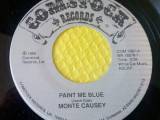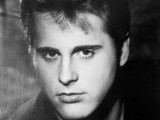I was privileged enough to be backstage and go on for these guys as a warm-up act, not full understanding the impact those artists had on country music. I wouldn’t trade a million dollars for that experience.
Country musician’s road travels New York to Nashville to Local 455
IF MONTE CAUSEY has his guitar with him, you know something good is bound to happen. Really good.
As Causey settles in at a hotel bar in Washington, D.C., Boilermakers taking a break from a long day lobbying their legislators at the annual LEAP conference begin to gather, inching in toward their Brother. They know something good is about to happen. Causey’s got his guitar.
Monte Causey’s path to becoming a Local 455 (Muscle Shoals, Alabama) Boilermaker and eventual International Representative, Construction Sector Operations, started out as a music career. But growing up in a musical family in North Hodge, Louisiana, (a part America known for its rich country music heritage) there was really no avoiding his natural ability and draw toward music. Even if he’d wanted to.
“My family all played music. I was around it all my life, and I just fell into it,” Causey says, adding that his mother had an opportunity to pursue a professional music career – but decided against it. “My dad was a die-hard straight country fan, and to him, there were only two kinds of music: country and western. And that’s how I was raised, you either sang country music or, well, you sang country music — take your pick.”
So, as Causey developed a taste for the sounds he liked best — among his favorites, Elvis Presley and Johnny Cash — he started singing. It wasn’t long before he picked up a guitar and learned to play. By ear.
“I never had any organized training in music,” he explains. He’s not bragging. His inability to read sheet music is not something he’s proud of, though it’s proof enough of the inevitability that music simply will take over when it runs through your veins.
“I started out playing the guitar to Johnny Cash’s ‘Folsom Prison Blues,’ and I learned that first riff at the beginning. And, of course being around a musical family, I watched them play, and I’d play along.”
He was good. And folks noticed.
“I wanted to be an entertainer. Most specific: I wanted to be a country music singer,” he says. “So, I played every little jamboree. Wherever there was a music show going on, I was trying to get on it — fairs, country music festivals, anything.”
“Standing on that square they took out of the Ryman Auditorium with a microphone in front of you — it doesn’t get any better than that.”
By the time he was nine years old, Causey had played the Louisiana Hayride, the famed radio and later TV show credited with launching the careers of Johnny Horton, Elvis Presley and Hank Williams, to name a few of its guests.
“That has . . . a kind of nostalgia, to be able to play a venue that so many great people have come through,” he recalls.
And he played with some of the best. Musicians and singers that laid the very foundation for country music: Roy Acuff. Ernest Tubb. Slim Whitman. Little Jimmy Dickens.
“I was privileged enough to be backstage and go on for these guys as a warm-up act, not fully understanding the impact those artists had on country music. I wouldn’t trade a million dollars for that experience.”
By age 18, Causey had cut an album of his own on Comstock Records and released three singles in Europe. “I had a lot of success on the stations with the releases that went out over there,” he notes.
He was playing a club four hours a night — Mondays and Tuesdays – in Bossier City, Louisiana, when two men approached him about managing him.
“I was 20 at the time, soon to be 21,” Causey says. “And they said, ‘We would like you to go to Nashville and record a demo.’” One of the men explained that his brother was signed to RCA Records and would be coming out with a single.
“I was thinking to myself, ‘OK, yeah right.’ But it was true. They came back two weeks later, and we headed to Nashville and cut a demo with three songs. I did a showcase for Polygram Mercury in Memphis at place called Shooters, and they enjoyed that. So, I went back to Nashville for a second showcase at a place called Diamond in the Rough, across from Tootsie’s on Broadway.”
That showcase, he says, is what catapulted him to going on the road with Cleve Francis, singing back-up and opening shows. He stayed on the road as a professional singer/musician from 1991-1996.
“It was absolutely wonderful being on the road,” he recalls. “As a young man at 21 years old until I was 26, being single and running up and down the road — from New York to the West Coast — we were running up and down the interstates singing country music! I was living the dream!”
What a dream. From a little kid playing warm-up acts for legends to a big kid touring with, well, more legends. Along a life-road littered with incredible experiences, people and highlights, two stand out for Causey.
One was playing the Grand Ole Opry. The mecca of country music, which Causey describes as surreal. (“It’s the Super Bowl of country music!”) He had played a few times on the Ernest Tubb Midnite Jamboree, and the owner had gotten him a spot to play a couple songs at the Opry.
“I walked in, and there was Grant Turner announcing and Little Jimmy Dickens standing beside the podium — I had played with him before, and he remembered me,” he says. “And I’m just looking at all these people — country artists from days gone by to present day — my eyes were as big as hubcaps. AND, I was going to get to sing there! Standing on that square they took out of the Ryman Auditorium with a microphone in front of you — it doesn’t get any better than that.”
The other moment happened in the days he was playing that club in Bossier City on Monday and Tuesday nights. That’s when a man walked in and asked if Causey minded if he joined him to try out a new guitar. Causey agreed, the guitarist plugged in, and they played. The guy was talented. Phenomenal, Causey says. At a break, Causey paid him a compliment. “I said, ‘By the way, you’re really good,’” Causey sheepishly recalls. The man’s reply: “I’m James Burton.” As in the James Burton: Elvis Presley’s lead guitarist, leader of the TCB Band. Monte Causey had admired Elvis Presley his entire life. He knew who James Burton was, but in that moment when a stranger asked to join in and jam, he hadn’t put two-and-two together. The duo ended up playing from venue to venue throughout the night, ending with breakfast at a small diner at 6:30 a.m. and becoming friends.
Fast-forward from then, back to 1996. Causey was on the road. Things were going well, but he also knew he wanted a plan for his future. He wanted to learn a trade and have benefits so that one day, he could retire, in case his music career “didn’t pan out the way I wanted.”
“I knew I wasn’t getting younger, so in 1996, Mike West [now the Boilermakers’ Director of National Transient Division Services] and I drove down to Muscle Shoals, Alabama, to Local 455 and took the Boilermaker test,” he says. “Eight months later, I entered the apprenticeship program.”
He has zero regrets about that decision, though it could have been tempting to circle back. The last music call he got was an offer to record back-up in Nashville with Bonnie Raitt. He declined, letting them know he might be back one day but was headed in a new direction. That was more than 20 years ago.
“I’m happy with what I do, and I’m happy with the decisions I’ve made over the past 47 years,” he says. He’s been married to his wife, Rhonda, since 1997, and their son Chandler is a 13-year-old honor student and competitive bowler. Causey is the only musician in his little family.
But that doesn’t mean he’s given up playing. He plays the occasional bluegrass festival and local venues. He sings at church, and he loves an impromptu jam session with friends.
“There’s nothing any better than just getting a group of people in a small setting just playing. It’s friends, and it’s potential friends you’re going to make. And everyone’s having a good time.”
Which is what happens on a spring evening in a hotel bar in Washington, D.C..
No mic, no special lighting, no sound check. Just Monte Causey with his voice, his guitar and a group of Boilermaker friends.
“There’s nothing any better than just getting a group of people in a small setting like this and just playing,” he says, breaking into a grin. “It’s friends, and it’s potential friends you’re going to make. And everyone’s having a good time.” Himself included.
Because when Monte Causey brings his guitar. Good things are bound to happen.
YOU KNOW YOU are curious, but among all the great’s he’s played and sung with, Monte Causey won’t give up the names of anyone who was a little, um, difficult to work with. What he will tell you is that Garth Brooks and Joe Diffie are genuinely “some of the super nicest people I’ve ever met.” So now you know.








